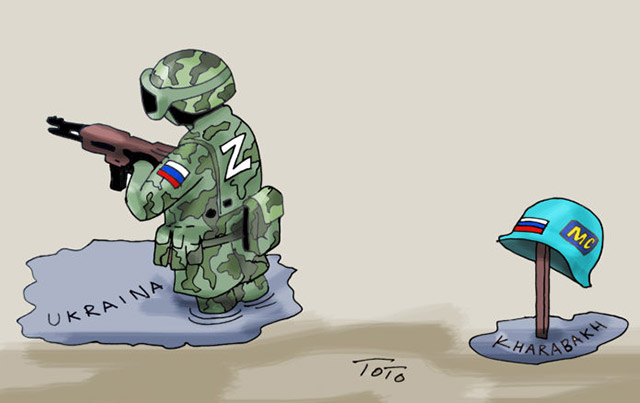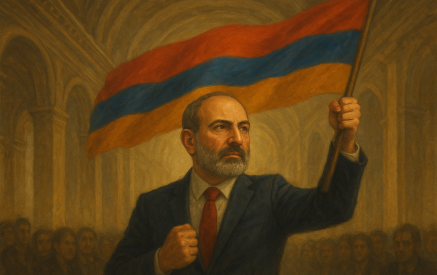by Edmond Y. Azadian
When people are confronted with crises, with impossible outcomes in sight, they resort to escapism as a defense mechanism, to avoid dealing with that harsh reality. Karabakh faces just such an impossible situation and escapism is no cure.
Armenians in the homeland and around the world will have to come together and find a solution. No other party will try to solve this crisis, and even if they attempt to resolve it, they will do so for their own advantage, not to help Armenia.
Read also
Since the 44-Day War, Azerbaijan has been creating one crisis after another, on a daily basis, outside the parameters of the November 9, 2020 tripartite declaration, which brought the Azerbaijan-created conflict to a halt. It seems rules are for Armenia and Karabakh only, with Azerbaijan breaking agreed-upon rules as well as accepted conventions since then. For example, contrary to international conventions, Baku has continued to keep more than 80 prisoners of war under detention. Several have already been sentenced to lengthy prison terms after farcical trials in Baku.
Before Armenia could protest and take the issue to major world bodies, Azerbaijan captured territory on Armenia’s border at Sev Lij in summer 2021. While the capture of territory was being debated, border killings took place in Yeraskh on the Armenia-Nakhijevan border. Just this month, Baku cut off the gas supply to the Armenian population in Artsakh, at a time when temperatures have plunged and snowstorms have made the need for heat vital. While Russian peacekeepers were negotiating the resumption of delivery of gas to Artsakh, to avoid a humanitarian crisis, on March 22-25 Azerbaijani forces made incursions in Karabakh proper, taking over the strategic village of Parukh, in the Askeran region, where they used Turkish-made Bayraktar drones to kill three Armenian soldiers and wound another 14.
Ever since the Karabakh war of 2020, and the adoption of the “two states, one nation” principle by Turkey and Azerbaijan, which was officially enshrined in the “Shusha Declaration,” Ankara has taken over the government in Baku and in particular the Azerbaijani armed forces, which have been creating and fomenting these crises with Armenia.
In the meantime, to please President Joe Biden, President Recep Tayyip Erdogan has agreed to begin negotiations with Armenia, supposedly without preconditions. So, Turkey’s Foreign Minister Mevlut Çavusoglu greets and hugs Armenia’s Foreign Minister Ararat Mirzoyan, and claims that productive negotiations have begun with Armenia, while he cynically delegates troublemaking to his underlings in Baku. He then asks Armenia to sign an inadmissible “peace treaty” with Azerbaijan, before moving one step further in the talks between Ankara and Yerevan.
While making such underhanded deals to the detriment of Armenia and Karabakh, Turkey and Çavusoglu are portrayed as heroes trying to bring together Russian and Ukrainian officials for a peace breakthrough. They are able to do this even as they enjoin Russian oligarchs and their billions to take refuge in Turkey!
It is a common occurrence in international relations that when a major power is bogged down in a conflict, almost certainly an eruption takes place in another part of the globe, to take advantage of that morass. Now that Russia has waged a failing war in Ukraine and engaged its forces there, Azerbaijan has taken the initiative to create a fait accompli in the Caucasus, by forcing its five-point peace agreement on Armenia. This situation was obvious for anyone to see but it also manifested itself in a post of the official Twitter account of the Ukrainian Parliament, where Verkhovna Rada, as the parliament is known, welcomed Azerbaijan’s latest actions in Karabakh, stating, “Azerbaijani armed forces have gone on the offensive in Karabakh, taking advantage of the circumstances that Russia has been sending troops to Ukraine,” from Armenia and from the contingent of Russian peacekeepers stationed in Karabakh.
The Ukrainian Chargé d’affaires in Armenia Denis Avtonomov immediately walked back the comments and assured Armenia that “this was not Ukraine’s official position.” The statement was deleted, but, in fact, it reflects the situation and the position of the Ukrainian government.
Azerbaijan has taken advantage of Russia’s involvement there and tried to open a second front for Moscow by attacking and taking over a strategic position in Karabakh which is under the jurisdiction of Russian peacekeepers. Although Russia’s Ministry of Defense has reported that Azerbaijan has evacuated the post, witnesses in Karabakh report that Azerbaijanis have left the village but not the strategic post and negotiations are still ongoing between the two parties.
As far as the position of Ukraine’s government is concerned, the post actually reflected President Volodomyr Zelenskyy’s actions. We may empathize with the plight of the Ukrainian people but President Zelenskyy himself is no friend of Armenia or Karabakh. We should acknowledge this, even if it is not politically correct to make that statement in the West. He sent arms to Azerbaijan during the 44-Day War and personally congratulated President Ilham Aliyev on his victory.
Armenians equally have a cause for concern in case President Putin achieves a decisive victory, because that will open up the possibility of bringing the former Soviet republics together under Moscow’s rule as a “union state,” as Armenia will be among them.
Let us be clear: what is happening in Ukraine is barbaric and heartbreaking and an act of war. What we are adding to that statement, however, is that the very same thing happened in Karabakh. Maternity hospitals were bombed and children died. Houses were bombed and entire villages were wiped out. We have been victimized by a false equivalence created by Azerbaijan and Turkey, which would lead anyone unfamiliar with the issue — 99 percent of the world — to put Karabakh in the same corner as Donbas and Luhansk. Armenia is being painted as a Russia-trained force trying to violate the territorial integrity of Azerbaijan rather than take back what has been Armenian land for millennia. Unfortunately, our enemies are strong and our allies toxic.
While the international community observed a deathly silence during the war in Karabakh, with the exception perhaps of former Secretary of State Mike Pompeo’s cynical remarks, “I hope Armenians can defend themselves,” this time around there was an uproar in the West when Azerbaijan made its moves. However, inexplicably, United Nations Secretary General Antonio Guterres issued a generic statement admonishing both parties to exercise restraint, while the major powers made pointed remarks to Azerbaijan. Thus, French Foreign Ministry released a statement saying, “France regrets armed incidents in the area of Parukh and Khramort and calls on all Azerbaijani units to return to the positions they held on the day of the declaration of ceasefire on November 9, 2020.”
On the other hand, during a briefing on March 25 by the US State Department Spokesperson Jalina Porter said, “The United States is deeply concerned about Azeri troop movement and other escalatory measures which are irresponsible and unnecessarily provocative.”
Although Armenia and Russia are supposed to be strategic allies, Moscow always kept parity between Armenia and Azerbaijan. Every time, the latter broke the ceasefire protocol. This time around, since the challenge is to the Russian peacekeeping forces, the Ministry of Defense has directed its criticism to Baku.
In a weekend statement, the ministry accused Azerbaijan of violating a Russian-brokered ceasefire that ended the war in 2020. It urged Azerbaijani forces to leave the peacekeepers’ “zone of responsibility.” The ministry assured on Sunday night that Azerbaijanis have taken their forces from Parukh. Karabakh Defense Forces have confirmed that the village is under the control of Russian peacekeepers but Azerbaijani soldiers continue to hold “fortified positions.”
Azerbaijan is defying Russia even as the latter has its hands full in Ukraine. Its Minister of Defense Zakir Hasanov has recently stated that, if necessary, “we can use most modern weapons against the Armenians,” while making another arrogant demand, asking the Armenian side to evacuate Karabakh of its “illegal military formations,” referring to the Karabakh defense forces. There is no such agreement in the November 9 ceasefire declaration. But there is another condition that Moscow and Baku have not honored: the ceasefire declaration calls for both armies to remain in the positions under their respective control on November 9. By contrast, Armenian forces were not defeated in the Kelbajar region but they were asked to evacuate, in a deal of collusion between Baku and Moscow. President Putin always tries to treat President Aliyev with kid gloves, because the latter shrewdly has refused to sign the mandate of the peacekeeping forces in Azerbaijan. Thus, Russia has its military footprint in Georgia, Armenia and Azerbaijan, under different conditions. Only its position in Azerbaijan is tenuous, because of the mandate issues.
Baku is blackmailing Moscow with a threat of opening a new front in the war in the Caucasus, knowing full well that the latter can ill afford a second front. The alternative for the war is pressure by Moscow on Armenia to accept the five point “peace plan” which represents a poison pill for Armenia.
Azerbaijan is in haste to achieve its goal, because Moscow and the Organization for Security and Cooperation in Europe (OSCE) are bogged down in Ukraine and Armenia is in a weak position to resist any pressure. Therefore, it is an ideal situation for Azerbaijan to create irreversible facts on the ground. Armenia has wisely referred Azerbaijan’s five-point peace plan to the OSCE Minsk Group and announced that it is ready to sit down immediately to negotiate a peace treaty under the auspices of that body.
Before the beginning of negotiations with Turkey, Armenia already made down payments, refraining from using some valuable and advantageous bargaining chips. Here again Ararat Mirzoyan has announced that Karabakh is not a territorial issue. He said that it is a matter of “rights” rather than building a case around the principal of remedial cessation, a principle which was used by East Timor, South Sudan and Kosovo in attaining independence.
A storm is gathering over Armenia and Karabakh. Let us hope that this is not the end of Karabakh as we know it.

























































